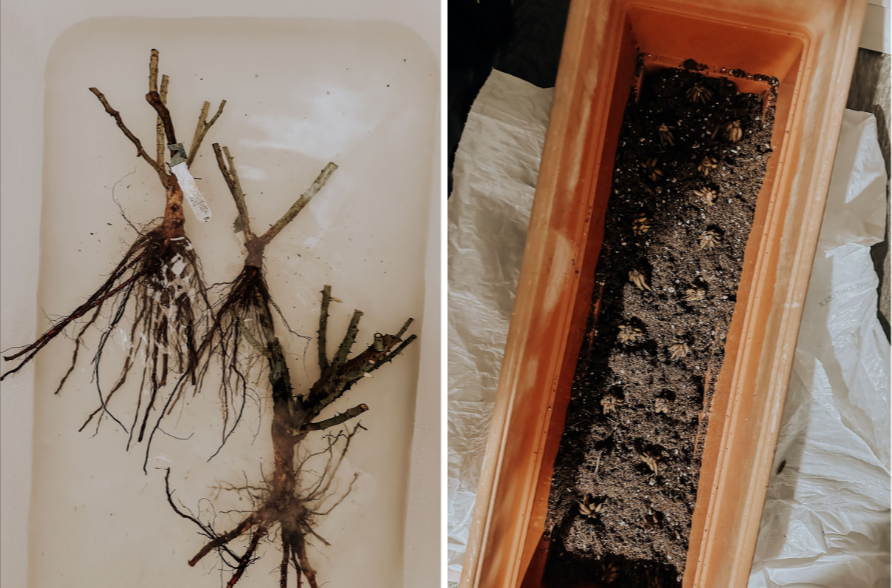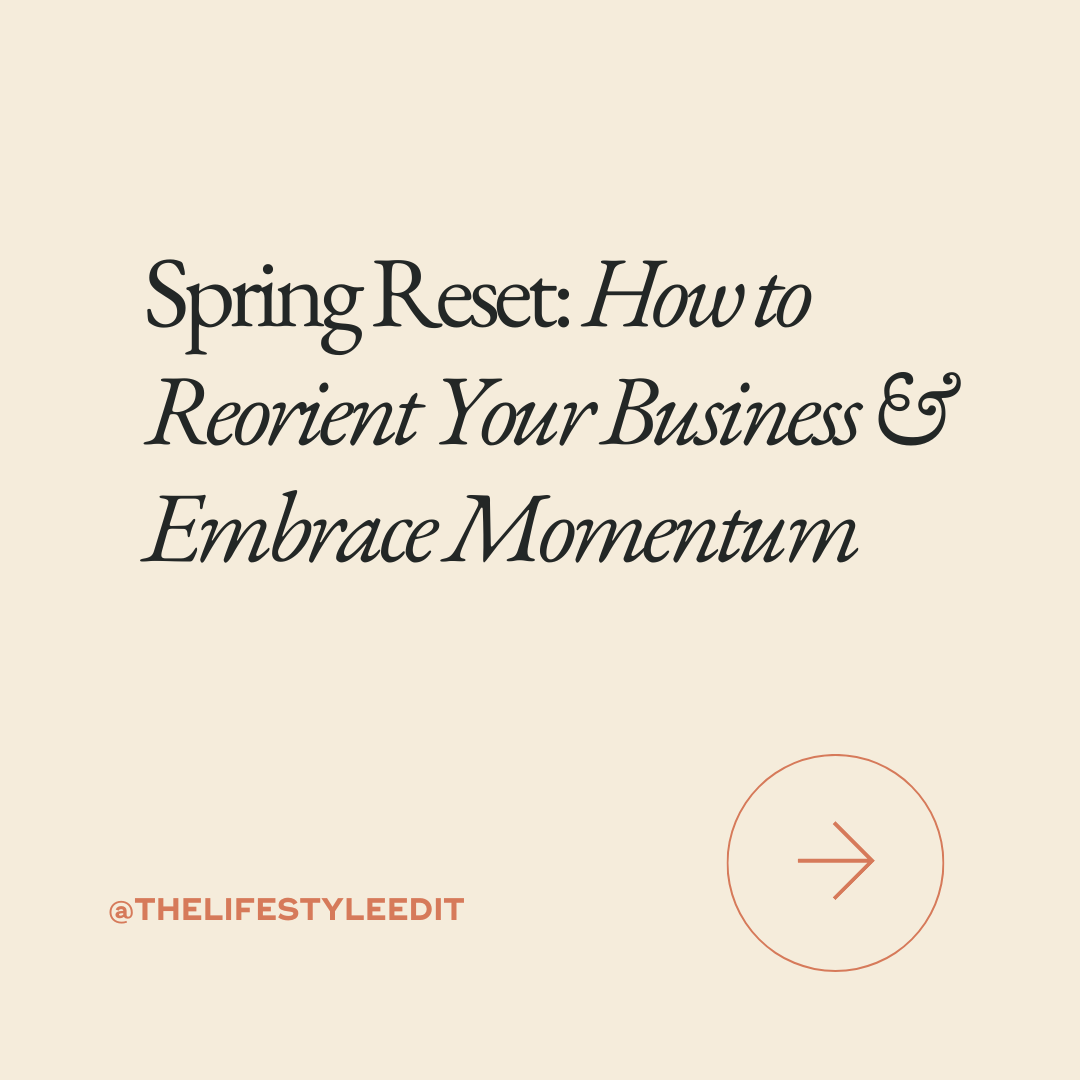Reflect, realign, and grow—without shame. Plus, the surprising business lessons I’m learning from my garden.
The Sunday issue is the more informal little sister to my more strategy-leaning Wednesday issue.
This time of year often brings with it the weight of evaluation. We get to the end of a quarter, compare the reality to the original vision, and many of us unconsciously default to “I’m behind” without fully examining what we’re measuring against—or why.
But to discern whether we’re “on track” or not, we first need a track to measure against.
We need actual benchmarks. Not feelings. Not vibes.
Because when we don’t have those anchors, we’re far more likely to conflate feelings with facts—internalizing every slow sales week or quiet month as proof that something’s broken, when in truth, we’re just moving through the natural cycles of building something sustainable.
And even if we are off-track—meaning we’re not on pace with the outcomes we set at the beginning of the year—there’s power in naming that without attaching shame to it. Not to spiral or over-correct. But to re-orient.
I know that feeling. You glance at the calendar, realize Q2 is literally days away, and your brain goes into overdrive:
“Wait, what did I even do in Q1? How can I play catch up in Q2? I need to be out there, making things happen…”
But before you rush to create a plan or push yourself to “get back on track,” I want to gently invite you to slow down and walk you through something that came up in a recent coaching session, because I have a feeling it might be true for you too.
One of my students realized that Q2 was around the corner and admitted she hadn’t set a clear plan so far this year.
She felt like she should quickly whip something up for the next 90 days, but was also aware of the deeper pattern: rushing forward without actually slowing down to reflect.
She said, “There’s fear that comes up when I think about what I actually want. What if I get disappointed again?”
And that’s what I want to speak to today.
You can’t judge yourself for not hitting the mark when you never gave yourself a target to begin with.
You can’t decide you “should have done more” when you’ve been running blindfolded—avoiding the data and the feedback loop that should actually inform your business decisions.
This is not about shame.
It’s about ownership.
And that starts with being willing to sit with the discomfort of what you’ve been avoiding.
So if you don’t feel “on track,” ask yourself:
- Did I actually create clear tangible benchmarks for the first quarter of the year? Can I clearly answer either “yes” or “no” for whether I hit those targets?
- Have I been tracking my progress weekly or did I set goals late last year without actually referring back and checking in on them at a regular cadence?
- And if I have been tracking, have I actually been acting on the feedback I’ve seen from the data?
So often we avoid reviewing a quarter because we don’t want to sit with the emotion it might bring up—whether that’s disappointment, regret or self-doubt.
It’s much easier in those moments to stay optimistic. To dive into the fun and sexy parts of planning and tapping into the promise that comes along with that.
It requires an entirely different level of entrepreneurial maturity to roll your sleeves up, stay informed about what’s going on, and doing the stretchy work to improve. Not at the end of the quarter when everything is said and done and there’s nothing you can do to change where you’ve landed. But week in-and-week-out.
When you avoid the data, you rob yourself of the opportunity to grow and play at your full potential. Seeing what’s happening gives you the opportunity to pivot, tweak or double down, and there’s where your power lies. In your ability to make informed, executive decisions. And that’s one of the only jobs that only you can perform.
At any given time, there will always be forces out of our control affecting our businesses – whether that’s the economy, the social-political landscape or things like our audiences’ spending patterns, for example; but there’s far more in our control than I believe many of us are willing to take ownership for.
But it requires shifting from hope to stewardship.
From bypassing to leadership.
From “manifesting” to managing.
And in case you need to hear this: don’t be afraid of making mistakes.
Mistakes aren’t the issue. In fact, we want to be making mistakes. That’s how you grow. But let’s make quality mistakes—the kind that come from taking action and learning in public—not mistakes that stem from being in the dark, avoiding data, or ignoring patterns.
I want you to make new mistakes – more nuanced and complex mistakes – rather than low quality ones that could have been avoided had you been doing this CEO work.
The more willing you are to look at what’s actually happening, the bigger capacity you build to hold emotions like fear, disappointment or shame, so that they no longer drive you into avoidance. Because when you’re no longer avoiding, you’re able to be in integrity with what you say you want.
Because that’s what integrity means.
Your actions are in alignment with your goals and the life and business you’re trying to cultivate.
You live what you say – and it’s reflected in your results and how you spend your days.
That’s why I always say that self-trust is a verb. You cultivate it by giving your brain evidence that you’re an energetic match for the “more” that you seek.
I set a goal.
I showed up.
I adjusted when I needed to.
I honored my non-negotiables.
I tracked what mattered.
I didn’t check out.
I didn’t make it mean something it didn’t.
I kept going.
We can’t expect to receive more when we’re not shepherding the business we currently have.
So take some time over the next week to really review what happened in Q1 and use those insights to make an intentional strategic plan for Q2.
And don’t wait until the end of Q2 to realize things didn’t go the way you wanted. Create a rhythm that allows you to course-correct in real time.
And with that… here’s a little peek behind the curtain at what’s been filling my days and thoughts lately—business, life, and everything in between:

- We’re hosting a full house for Sunday brunch this weekend—three girlfriends, their partners, and all our collective children. A friend asked how I’m making it happen in a New York apartment, and I told her: years ago, I used to tell myself, it’s too small, it’s not the right time, all the things. But I’ve decided I’m no longer available for those excuses. I’d rather have a house full to the brim with people we love and kids turning the place upside down than wait for the “perfect” moment or stress about space. One of my intentions when we moved was to give my brain evidence that entertaining can feel easy. A midweek dinner. A bring-a-dish brunch. A casual evening walk that ends in a last minute one-pot dish dinner at our place. Hosting doesn’t have to be extravagant to be meaningful. So I’m inviting you to reflect—what are the things that bring you joy, but you’ve unconsciously created barriers around? Spring is a beautiful time to dust those off.
- My garden is bringing me a level of joy I didn’t even know I needed. I wake up genuinely excited to water the plants and do my garden chores. This week my bare roses arrived, the ranunculus are almost ready to plant, and the kids are getting involved too. It’s become a new obsession—gardening podcasts, YouTube channels, GardeningTok. And I realized: it’s the first hobby I’ve had in a long time that’s totally separate from my business. For so many of us, our business was once a passion—something we geeked out over before it made us money. But it’s also powerful to have passions outside of business. If you’ve been feeling stagnant or over-consumed by work, maybe what you need isn’t to take on more projects to grow your business—but to be lit up by something just for you.

- Gardening has also taught me a major lesson in patience. I’m planting everything from seeds and bulbs, and I want to walk out there and see it all fully bloomed. But that’s not how it works. I’ve been reminding myself that it’s not about obsessing over when the blooms will come—it’s about managing the conditions. Is the plant in the right light? Is the soil healthy? Am I watering and fertilizing consistently? Business works the same way. You don’t need to micromanage the result if you’re tending to the daily rhythm that supports the outcome. As James Clear says, “focus on your current trajectory, not today’s results.” That’s where the power is.
- I recently booked my next round of blood work—and I can’t recommend it enough. I’m doing labs every 90 days right now because I’m actively focused on improving some of my markers, and I want to track whether the lifestyle shifts I’m making are working. So much of the exhaustion and depletion I felt for years made sense once I got extensive blood work. All the pre-autoimmune indicators were there (despite my PCP telling me that my symptoms were just a byproduct of having two small children). And just like business—you can’t change what you can’t see. There’s something incredibly empowering about being able to make informed decisions, grounded in data. My word for this year is vitality, and I can honestly say that, looking at these first 90 days, I’m proud of how deeply I’ve honored that. If it’s been a while since you’ve done lab work, I highly recommend it. Most insurance plans cover basic blood work but if you have the resources, it’s worth investing in comprehensive labs.My only regret is not doing it sooner.
- The other day, I had a three-hour phone call with one of my girlfriends from home. You know the ones—you don’t speak often, but when you do, the conversations crack you wide open. One question she asked me has been sitting with me ever since: “We’ve done all this deconditioning work. What can we do so our children don’t have to undo as much?” I don’t have the answer. But it’s a question I’ll be sitting with for a while. If you’re a parent, maybe sit with it too: What are you unlearning now that you’d love for your children never to have to decondition from?

Nothing makes me happier than getting to do things like chaperoning my kids’ school trips. My eldest still loves sitting next to his mama on the school bus so I’ll take that for as long as I can.
- And finally, let’s talk about accountability. Most people associate it with punishment. If I don’t do the thing, I punish myself. But real accountability is just a feedback loop. It’s: What’s the goal? Am I honoring what I said I wanted? And if not—why? That’s it. It’s about curiosity, not condemnation. This quarter, can you create a new standard—one where reviewing your actions is an act of self-respect, not self-judgment? Imagine how much more support you’d allow in if you stopped treating reflection as something dangerous and started seeing it as a practice in integrity. How different would your business feel then?







